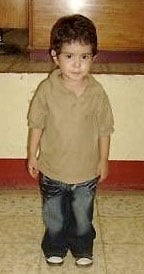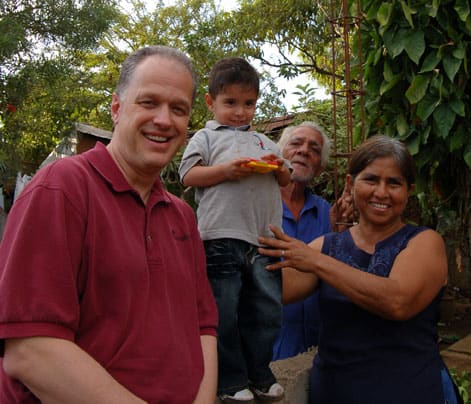Something to Get Excited About
Meet Jeffry. He lives in Nicaragua. He is our one millionth registered child.
 A registered child is different than a sponsored child in that the registered child doesn’t have a sponsor . . . yet. Once the registered child gets a sponsor, that child is a sponsored child. Makes sense, right?
A registered child is different than a sponsored child in that the registered child doesn’t have a sponsor . . . yet. Once the registered child gets a sponsor, that child is a sponsored child. Makes sense, right?
The registered children are the ones whose pictures you see on the sponsor a child page at compassion.com and in the child packets at concerts and other events, such as Compassion Sunday.
The registered children are the children who are waiting to be chosen by a sponsor and who the Unsponsored Children’s Fund assists until that sponsor comes along.
The Unsponsored Children’s Fund bridges the gap between registration and sponsorship. It allows the registered child to have all the same benefits as the sponsored child.
We don’t have one million children waiting for sponsors. Jeffry is the one millionth child concurrently registered. More than 850,000 of those children already have sponsors. And since Compassion began in 1952, nearly two million children have been part of our programs.
That’s a little context for this post that Mark Hanlon, Compassion’s senior vice president of sponsor and donor development, submitted from Nicaragua yesterday.
It was like so many other Compassion child home visits I’d done before (and in my 28 years at Compassion, I’ve done a few!), but this one seemed to hold a bit of extra anticipation and excitement for me.
I happened to be in Nicaragua two weeks after we had registered our millionth child for the very first time. It turns out that this millionth child is a little 3-year-old boy in Nicaragua.
The office staff there was so excited, and they set up a home visit for me to meet little Jeffry.
It was kind of strange because Jeffry had no idea what a historic milestone he is in the history of Compassion.
In fact, when I got there with several of the Compassion Nicaragua staff and some of the center staff, he was totally overwhelmed. Too much attention by too many grown-ups all at once – and he did what many normal little 3-year olds do – he covered up his eyes with his hands (a la “see no evil”) and pretended we weren’t there!
When his grandmother (who is his caregiver since his mother now lives in the U.S. and couldn’t take him with her) tried to get him to take his hands away from his face, he ran away crying.
That was OK. We shifted our focus to the grandmother and asked her questions about the impact of having Jeffry registered in the program at the church.
She talked about the hope and a future she had for Jeffry to get through high-school and maybe even go to university.
She expressed concern over his health and the health of her husband who has diabetes.
She talked about the challenges of supporting a household of 17 adults and children in her dirt floor, cinder block structure in the heart of economically challenged Managua.
Her husband (the diabetic) and her three sons work hard as day laborers – when there is work – and they have terrible difficulty in making ends meet. She wanted better for her little grandson, Jeffry.
Then it struck me that this visit indeed was like most other visits I’d done. Parents (and grandparents) worldwide want the same thing for their children – a better future than what they have.

It didn’t matter one bit to Jeffry or his grandmother that he is Compassion’s millionth child. What did matter is that they now have some hope.
And now, I really was excited to be there! Not because I got to meet the millionth child in his home, but because I got to see something that Compassion gets to be a part of with the local church every day. Releasing a motherless child, living in extreme poverty, living with 16 other people, from poverty in Jesus’ name.
Now that’s something to get excited about!
Continue Reading ›Priorities
As I’ve gotten older, I’ve found that it’s getting easier to set priorities in my life. Some of the things I used to deem important just don’t mean that much to me anymore. And some things that I never valued are priceless to me now. I guess that’s part of maturing.
20 years ago I didn’t know much about global poverty…and therefore I didn’t care about being part of the solution. It wasn’t a priority to me. Today, having witnessed firsthand the suffering of children in developing countries…having heard their tummies growl…and having seen the lack of hope in their sullen eyes, I do care. It’s a priority to me now.
So when I read an online article in the Denver Post from a college student trying to explain why he would rather spend $1,000 on his dog than $51 to feed a starving child on the other side of the world, I took it personally. It was an attack on one of my priorities, after all. But then I’m reminded that I was in the same place when I was his age.
We’ve still got a long way to go, don’t we? There’s plenty of work to be done, teaching the world that caring for the poor is not an option–it’s an obligation. It’s a mandate from God himself.
And one hurdle is convincing our neighbors, family and friends that they don’t have to choose between caring for their loved ones…and caring for those on the other side of the world. Those two are not mutually exclusive. We are called to do both.
So my message to the college student–and for those of you who are also struggling with where to set your priorities: do both. You can give hope to a child in poverty and take care of your dog–or your family–at the same time. You don’t have to choose between the two. You can make both a priority. Indeed, we are called to do just that.
Continue Reading ›

